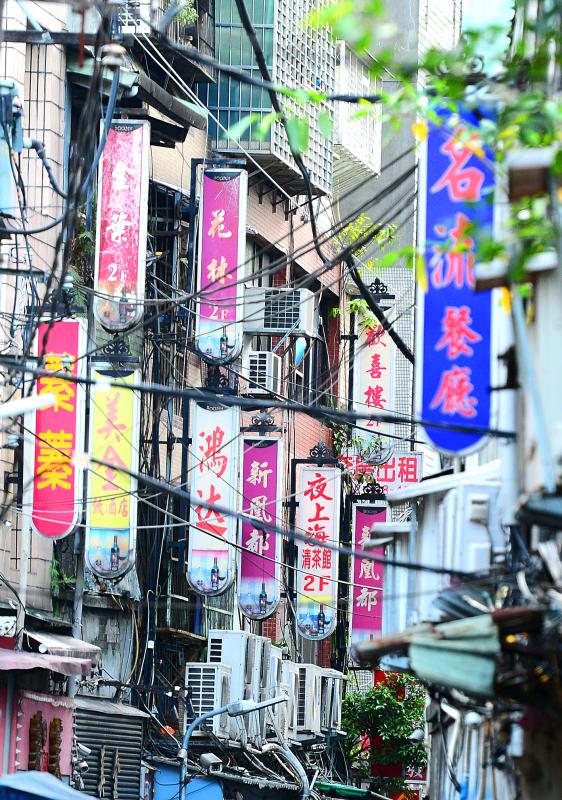The Control Yuan yesterday launched an investigation into the alleged sex trade in Taipei’s “teahouses,” as the establishments draw greater attention after they were linked to a cluster of COVID-19 infections in Wanhua District (萬華).
Control Yuan member Lin Kuo-ming (林國明) said that local officials have been negligent in addressing the matter, after teahouses, known as “A-gong diam” (阿公店) in Hoklo (commonly known as Taiwanese), were shown to be the center of a COVID-19 cluster.
There are more than 100 such establishments in Wanhua, but most are registered as restaurants or eateries, despite employing hostesses to accompany customers for drinking, chatting and other services, which clearly fall outside of their designated business, Lin said.

Photo: Wang Yi-sung, Taipei Times
“As local authorities have not cracked down on such contraventions, a probe will be launched into the matter,” Lin said.
Although the teahouses along Wanhua’s streets and alleys are among the nation’s most famous, there are similar businesses on a smaller scale in other cities and towns.
In the past few years, officials have said that there has been an increase in the number of women from foreign countries such as China and Vietnam working as hostesses in teahouses, some of which provide sexual services.
Many are undocumented after entering the country on a working contract that they then breach or as part of a false marriage scheme, police said.
Former Taipei City councilor Tung Chung-yen (童仲彥), an advocate for the legalization of prostitution, has said that the Taipei City Government should establish a legal “red light” district in Wanhua, to regulate sex work and protect workers.
Such a district would also better safeguard public health during an epidemic, Tung said.

Taiwanese can file complaints with the Tourism Administration to report travel agencies if their activities caused termination of a person’s citizenship, Mainland Affairs Council Minister Chiu Chui-cheng (邱垂正) said yesterday, after a podcaster highlighted a case in which a person’s citizenship was canceled for receiving a single-use Chinese passport to enter Russia. The council is aware of incidents in which people who signed up through Chinese travel agencies for tours of Russia were told they could obtain Russian visas and fast-track border clearance, Chiu told reporters on the sidelines of an event in Taipei. However, the travel agencies actually applied

New measures aimed at making Taiwan more attractive to foreign professionals came into effect this month, the National Development Council said yesterday. Among the changes, international students at Taiwanese universities would be able to work in Taiwan without a work permit in the two years after they graduate, explainer materials provided by the council said. In addition, foreign nationals who graduated from one of the world’s top 200 universities within the past five years can also apply for a two-year open work permit. Previously, those graduates would have needed to apply for a work permit using point-based criteria or have a Taiwanese company

The Shilin District Prosecutors’ Office yesterday indicted two Taiwanese and issued a wanted notice for Pete Liu (劉作虎), founder of Shenzhen-based smartphone manufacturer OnePlus Technology Co (萬普拉斯科技), for allegedly contravening the Act Governing Relations Between the People of the Taiwan Area and the Mainland Area (臺灣地區與大陸地區人民關係條例) by poaching 70 engineers in Taiwan. Liu allegedly traveled to Taiwan at the end of 2014 and met with a Taiwanese man surnamed Lin (林) to discuss establishing a mobile software research and development (R&D) team in Taiwan, prosecutors said. Without approval from the government, Lin, following Liu’s instructions, recruited more than 70 software

Chinese spouse and influencer Guan Guan’s (關關) residency permit has been revoked for repeatedly posting pro-China videos that threaten national security, the National Immigration Agency confirmed today. Guan Guan has said many controversial statements in her videos posted to Douyin (抖音), including “the red flag will soon be painted all over Taiwan” and “Taiwan is an inseparable part of China,” and expressing hope for expedited reunification. The agency last year received multiple reports alleging that Guan Guan had advocated for armed reunification. After verifying the reports, the agency last month issued a notice requiring her to appear and explain her actions. Guan